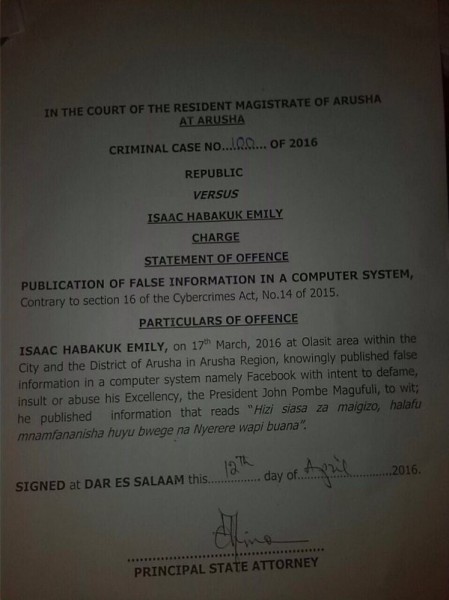Tanzanian netizen Isaac Habakuk Emily, who hails from the Arusha region in the north of the African nation, appeared in court on April 15, 2016 on charges of “insulting” the country's president, John Magufuli. Emily's statements are allegedly contrary to Section 16 of Tanzania's Cybercrime Act No. 14 of 2015, which says:
Any person who publishes information, data or facts presented in a picture, text, symbol or any other form in a computer system where such information, data or fact is false, desceptive, misleading or inaccurate commits an offence, and shall on conviction be liable to a fine not less than three million shillings or to imprisonment for a term not less than six months or to both.
Emily is accused of posting a controversial Facebook message (in Swahili) on March 17, 2015, even while knowing that counterfactual criticism of the country's president is against the law. His comment was in reference to President Magufuli's surprise live call to Clouds TV‘s current affairs program, 360, during which the president thanked the presenters and expressed his admiration for the show.
Neither Emily's personal Facebook page, nor the discussion page on which he is reported to have posted the comment, have come up in searches, but his Facebook comment allegedly read:
Hizi siasa za maigizo, halafu mnamfananisha huyu bwege and Nyerere wapi buana.
Theatrics in politics [referring to the live call], how come you compare this imbecile [Magufuli] to Nyerere [Mwalimu Nyerere, Tanzania's beloved first president]?
His offence has taken place against the backdrop of Tanzania's parliament passing a cybercrime bill on April 1, 2015, to address cybercrime issues such as child pornography, cyberbullying, online impersonation, electronic production of racist and xenophobic content, spam, illegal interception of communications, and the publication of false information.
Despite widespread opposition from politicians, social media practitioners, donors and human rights activists, the bill was pushed through parliament with relatively little discussion or debate. Former president Jakaya Kikwete signed it into law in May 2015.
Opponents of the Cybercrime Act argue that the law gives too much power — without meaningful oversight — to police, bestowing upon them the ability to search the homes of suspected violators of the law, seize their electronic hardware, and demand their data from online service providers. They have also cautioned that police or the state could use their power to harass online activists or social media users.
In October 2015, two Tanzanians became the first victims of the new law. Benedict Angelo Ngonyani, a 24-year-old student at Dar es Salaam Institute of Technology, was charged for publishing materials which are “false or not verified by relevant authorities.” It is alleged that he posted a Facebook post claiming that Tanzania's Chief of Defence Forces, General Davis Mwamunyange, had been hospitalized after eating poisoned food.
That same month, another netizen, Sospiter Jonas, was arraigned in a primary court in Dodoma Region and charged with “misuse of the Internet” after he posted a message on Facebook saying that Tanzanian Prime Minister Mizengo Pinda “will only become a gospel preacher.”
In November 2015, four Tanzanians — Leila Sinare, Godfrey Soka, Deo Soka and Monica Gaspary Soka — were charged under Section 16 of Cybercrime Act 2015 for publishing false, election-related information on the social messaging platform WhatsApp. The four appeared before a Magistrate's court in Dar Es Salaam on November 6, 2015. Public prosecutors alleged that the accused published audio information on a WhatsApp group called the “Soka Group”, that was intended to mislead the public during the October 2015 Tanzanian general elections, which were plagued by accusations of vote-rigging.
As far as this latest incident goes, Emily is scheduled to appear in court again on April 18, 2016 for judgement on his bail application.





28 comments